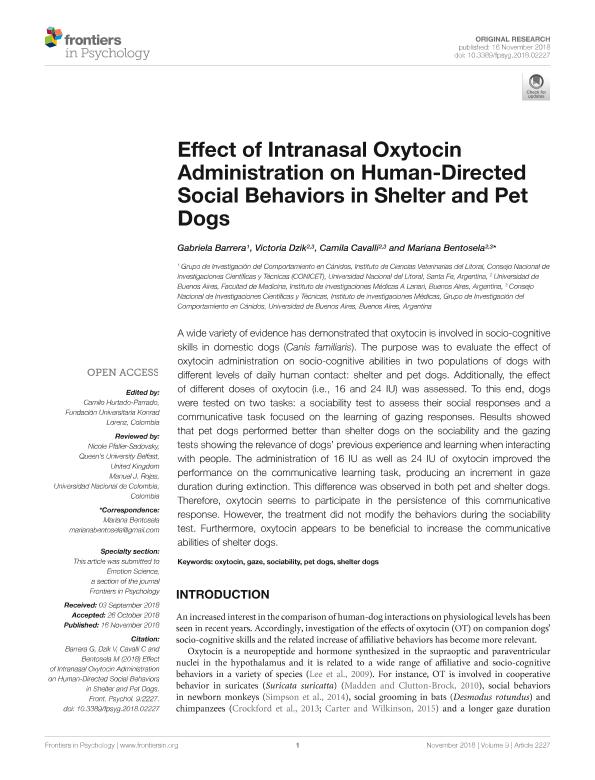Artículo
Effect of intranasal oxytocin administration on human-directed social behaviors in shelter and pet dogs
Fecha de publicación:
11/2018
Editorial:
Frontiers Research Foundation
Revista:
Frontiers in Psychology
ISSN:
1664-1078
Idioma:
Inglés
Tipo de recurso:
Artículo publicado
Clasificación temática:
Resumen
A wide variety of evidence has demonstrated that oxytocin is involved in socio-cognitive skills in domestic dogs (Canis familiaris). The purpose was to evaluate the effect of oxytocin administration on socio-cognitive abilities in two populations of dogs with different levels of daily human contact: shelter and pet dogs. Additionally, the effect of different doses of oxytocin (i.e., 16 and 24 IU) was assessed. To this end, dogs were tested on two tasks: a sociability test to assess their social responses and a communicative task focused on the learning of gazing responses. Results showed that pet dogs performed better than shelter dogs on the sociability and the gazing tests showing the relevance of dogs' previous experience and learning when interacting with people. The administration of 16 IU as well as 24 IU of oxytocin improved the performance on the communicative learning task, producing an increment in gaze duration during extinction. This difference was observed in both pet and shelter dogs. Therefore, oxytocin seems to participate in the persistence of this communicative response. However, the treatment did not modify the behaviors during the sociability test. Furthermore, oxytocin appears to be beneficial to increase the communicative abilities of shelter dogs.
Palabras clave:
GAZE
,
OXYTOCIN
,
PET DOGS
,
SHELTER DOGS
,
SOCIABILITY
Archivos asociados
Licencia
Identificadores
Colecciones
Articulos(ICIVET-LITORAL)
Articulos de INST. DE CIENCIAS VETERINARIAS DEL LITORAL
Articulos de INST. DE CIENCIAS VETERINARIAS DEL LITORAL
Articulos(IDIM)
Articulos de INST.DE INVEST.MEDICAS
Articulos de INST.DE INVEST.MEDICAS
Citación
Barrera, Gabriela Luciana; Dzik, Marina Victoria; Cavalli, Camila María; Bentosela, Mariana; Effect of intranasal oxytocin administration on human-directed social behaviors in shelter and pet dogs; Frontiers Research Foundation; Frontiers in Psychology; 9; 2227; 11-2018; 1-9
Compartir
Altmétricas




